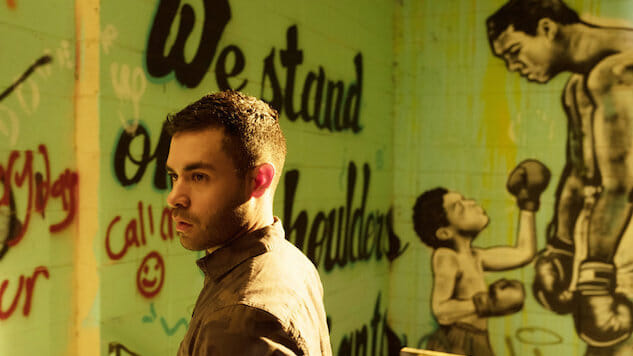Fine, It Won’t Kill You to Check Out The Purge
Photo: Patti Perret/USA Network
The Purge franchise—four films and now a TV series—has a fairly simple premise: Once a year, the United States goes through a 12-hour-long period where all crime is legal, which “naturally” leads to purging the country of criminals, general overpopulation, and those violent, nasty desires we all obviously must have. As for the rest of the story built in the films—such as their Big Bad, the New Founding Fathers of America (NFFA)—USA Network’s new series holds the audience’s hand just enough to help any newbies understand the political—and financial—circumstances that created this new order and allow it to continue for as long as it does.
While there’s an obvious incentive for anyone who’s followed the franchise to continue doing so here, The Purge as a TV series should stand alone as such. And as someone who hasn’t watched The Purge movies, the episodes I’ve seen—including the pilot, “What Is America?” which picks up the action a little more than an hour and a half before the Purge begins—have given me enough reason to watch the rest of the season, just to see how it all shakes out. (Initially, it was rumored that this television adaptation of The Purge would take place on non-Purge days, but, flashbacks aside, USA’s version is fully about making it through those 12 hours of violence and uncertainty. Non-Purge heads WILL be disappointed to know the series doesn’t focus on the more mundane crimes one can commit during the Purge, either. But there’s always next Purge. Or the Purge after that. Or the Purge after that.)
In fact, the main advantage of turning The Purge into a TV series is the potential to expand on its mythology—and perhaps combat the argument that the concept is nihilistic and cynical in the process. While Purge franchise creator and series showrunner James DeMonaco has said that breaking story for this series made him realize there are far more stories to tell with the film franchise, hopefully he realizes that makes this series version of The Purge perfect for anthology purposes. Unfortunately, the nature of The Purge is such that everyone has to live by the world’s established rules, but they don’t necessarily have to interact: Everything is connected, just not literally. This means that the series feels uneven; while viewers can latch onto the characters or parts of the story they find most entertaining, there will be those they find lacking to sit through as well.
The story The Purge clearly considers its emotional center is that of siblings Miguel (Gabriel Chavarria) and Penelope (Jessica Garza), whose parents were murdered in the first Purge despite assurances of their safety from the NFFA. In USA’s series, Miguel spends Purge night looking for his sister, who’s gone from rehab to a Purge death cult (yes, a cult where members sacrifice themselves to Purgers). While the arc succeeds early on—it’s a story of love and family, which is the type of thing that keeps the franchise from being only about the senseless violence—the problem is that Miguel’s odyssey either has to end in tragedy or triumph… and the chances of that triumph happening any time before the end stretch of the first season’s 10 episodes are slim. Penelope, despite being introduced as naive and indoctrinated, soon becomes a far more interesting character: She is very much en route to absolute doom, and the drama surrounding her is more a matter of wondering how she’s going to save herself than finding out if Miguel is going to make it to her in time.
-

-

-

-

-

-

-

-

-

-

-

-

-

-

-

-

-

-

-

-

-

-

-

-

-

-

-

-

-

-

-

-

-

-

-

-

-

-

-

-








































